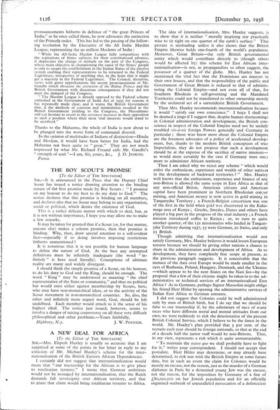THE BOY SCOUT'S PROMISE
[To the Editor of THE SPECTATOR] SIR,—It is announced in the Press that the Deputy Chief Scout has issued a notice drawing attention to the binding nature of the first promise made by Boy Scouts : "I promise on my honour to do my best to do my duty to God." The notice declares that this promise is binding on all members, and declares also that no Scout may belong to any organisation, social or political, which denies the existence of God.
This is a rather delicate matter with which to deal, but, as it is not without importance, I hope you may allow me to make a few remarks.
It may be taken for granted that if a Scout (or, for that matter, anyone else) makes a solemn promise, then that promise is binding. Why, then, draw special attention to a self-evident fact—especially if so doing involves imposing restrictions hitherto unmentioned ?
It is notorious that it is not possible for human language to define the nature of God. At the best any attempted definitions must be infinitely inadequate (the word " in- finitely " is here used literally). Conceptions of ultimate reality are many and widely divergent.
I should think the simple promise of a Scout, on his honour, to do his duty to God and the King, should be enough. The word " King " may be understood as meaning "the chief representative of the State or community," and thus no political bar would exist either against membership by Scouts, here, who may have non-monarchical ideas, or to the activity of the Scout movement in non-monarchical countries. So, also, the other and infinitely more august word, God, should be left undefined. Each member would attach to it the sense of his highest ideal. The notice just issued, however, seems to involve a danger of raising controversy on all these very difficult philosophical and other problems.—Yours faithfully,


































 Previous page
Previous page